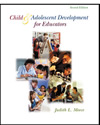| authoritarian parenting | A style of parenting that is high on the demand/control dimension but low on acceptance/responsiveness. It is characterized by low warmth and little positive involvement. Rigid rules are set with the expectation they will be followed due to parental authority.
|
 |
 |
 |
| authoritative parenting | A style of parenting characterized by warm, responsive involvement, and the setting of appropriate and clear standards for behavior. The child's autonomy is encouraged by providing rationales for rules and showing respect of her rights and opinions.
|
 |
 |
 |
| autonomy | The ability to be independent and self-motivated; to control and assume responsibility for one's own actions.
|
 |
 |
 |
| birth order | The child's position in the family, whether born first, second, last, and so forth.
|
 |
 |
 |
| chronosystem | Term used by Bronfenbrenner to refer to the involving the timing and patterning of events in an individual's life and the position of that individual's life in the larger flow of historical time.
|
 |
 |
 |
| corregulation | Control shared by parents and children which develops in middle childhood.
|
 |
 |
 |
| emotional maltreatment | Rejection and consistent lack of concern for another's emotional well-being.
|
 |
 |
 |
| exosystem | In Bronfenbrenner's theory, the system that influences the child's development only indirectly.
|
 |
 |
 |
| familialism | The strong identification with and attachment to both the nuclear and extended family, and the feelings of loyalty, respect, duty, and reciprocity which accompany such familial attachment.
|
 |
 |
 |
| inductive discipline | A discipline technique in which parents offer explanation for their rules and ask children to reflect on their behavior; helps children develop self-control and self-discipline.
|
 |
 |
 |
| macrosystem | In Bronfenbrenner's model, the larger culture and possibly subculture in which the individual lives- including ideologies, traditions, and values. Elements of the macrosystem include regional identity, nationality, ethnicity, and religious affiliation.
|
 |
 |
 |
| mesosystem | In Bronfenbrenner's model, interactions among components of the microsystem.
|
 |
 |
 |
| microsystem | In Brofenbrenner's model, the child's immediate environment (the family, peer group, school).
|
 |
 |
 |
| neglect | A form of child abuse involving inattention to basic needs such as food, clothing, and medical care.
|
 |
 |
 |
| parenting style | Common patterns of parenting styles including authoritarian, permissive, and authoritative.
|
 |
 |
 |
| permissive-indifferent parenting | A style of parenting in which children are left to make their own decisions and regulate their own behavior that often result from or leads to neglect.
|
 |
 |
 |
| permissive-indulgent | A style of parenting in which parents are very warm and responsive, and put few demands or expectation on their children. Rules are no clearly communicated or enforced leaving children to make their own decisions and regulate their own behavior.
|
 |
 |
 |
| physical abuse | Purposeful bodily injury caused by another.
|
 |
 |
 |
| power assertive discipline | A discipline style in which parents attempt to control their children's behavior by use of commands and imperatives based solely on their authority.
|
 |
 |
 |
| sexual abuse | Contacts between the child and adult in which the child is being used for sexual stimulation.
|
 |
 |
 |
| simpatía | The felt need for behaviors, such as conformity and empathy, which promote harmonious, pleasant social relations.
|
 |
 |
 |
| socialization | The social processes in which a child is prepared to be a productive and competent member of society.
|



 2002 McGraw-Hill Higher Education
2002 McGraw-Hill Higher Education